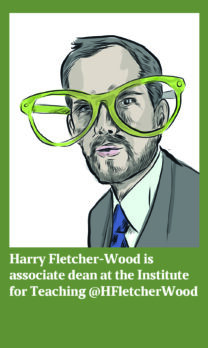Guest reviewer Harry Fletcher-Wood takes us through the best of the education blogosphere.
I used to be a Renaissance man… now I’m a teacher
By Cara Bleiman
Cara Bleiman’s UCAS reference described her as a “Renaissance man” who found time for schoolwork, to “take part in the debating and newspaper clubs, play in an orchestra, go to museums, read books, get midge-bitten trudging around the Highlands for a Duke of Edinburgh award and have plenty of time left to catch up on ER and Friends”.
As a teacher, however, her intellectual life “has taken a real hit. Goodbye to the theatre, evening classes, playing music or even reading a book – teaching takes up all your spare time and even some of that previously ring-fenced time for sleep and basic body admin”. Bleiman argues that to achieve high standards and to inspire students, we need to “model self-improvement and the pursuit of knowledge ourselves… if we don’t make time for full-time teachers and leaders to do this then we have little hope of nurturing a future generation of ‘Renaissance men’, let alone women.”
Furnishing the abstract with the specific: teaching disciplinary practice
By Michael Fordham
Michael Fordham challenges the way we construct curricula. Curriculum theorists, he argues, examine what is common to scientists, such as forming hypotheses, and convert them into a definition of “the discipline of science” that is taught in schools. Fordham suggests that disagreement over what the discipline is makes this implausible: “astrophysicists, inorganic chemists, molecular biologists, geologists, and so on, all have distinct approaches to studying the natural world and, although it might be possible to draw out generic commonalities between them, a definition of ‘science’ based on that generalisation will always fall short”. He argues for a rethink: “Rather than distil some general, abstract ideas about ‘how the discipline works’, we would be better off specifying a range of specific cases of disciplinary practice for children to learn, from which we can as teachers tease out the similarities and differences in approach that characterise our respective disciplines.”
Practice with purpose: the emerging science of teacher expertise
Deans for Impact
This paper applies deliberate practice to teacher education. K Anders Ericsson is perhaps most famous via Malcolm Gladwell, who oversimplified his work into the claim that 10,000 hours of practice can lead to mastery. Having tried to set us straight on Gladwell’s work in his last book, Ericsson has now worked with Deans for Impact to show how the principles of deliberate practice apply to teacher education. The result is seven priorities, such as work towards well-defined, specific goals, and receive and respond to high-quality feedback. For each priority, they draw out practical implications, such as when feedback should be given and how it might be used. The paper also discusses briefly the challenges teacher education currently faces in not having established, effective techniques, or an order in which to build skills. This paper seems likely to shape much of our thinking about teacher education: it’s worth reading now.
Reading none of the books as a route to loving reading – Fred’s story
By Alex Ford
Alex Ford describes lunch with Fred, a former teacher now in his eighties. Fred taught a remedial class in a Bradford middle school who wouldn’t read books: “they skirted around the books like there was some sort of invisible barrier there”.
While Ford’s “inner historian” watches for “educational prejudices… especially from someone who taught during the progressive, Piaget-inspired 60s and 70s”, Fred explains how he locked the school’s books away, stopped chasing students to bring in their own, and read them football scores, ghost stories, newspapers and novels – while leading practice in key words and vocabulary each day. Ford wonders “how I might tackle the issue of soft prejudice with our octogenarian companion”, explains that students “had to be pushed out of the nest eventually”. The rest of the post explains what Fred did, and why Ford left the pub “somewhat humbled, and definitely a little wiser.”













Your thoughts